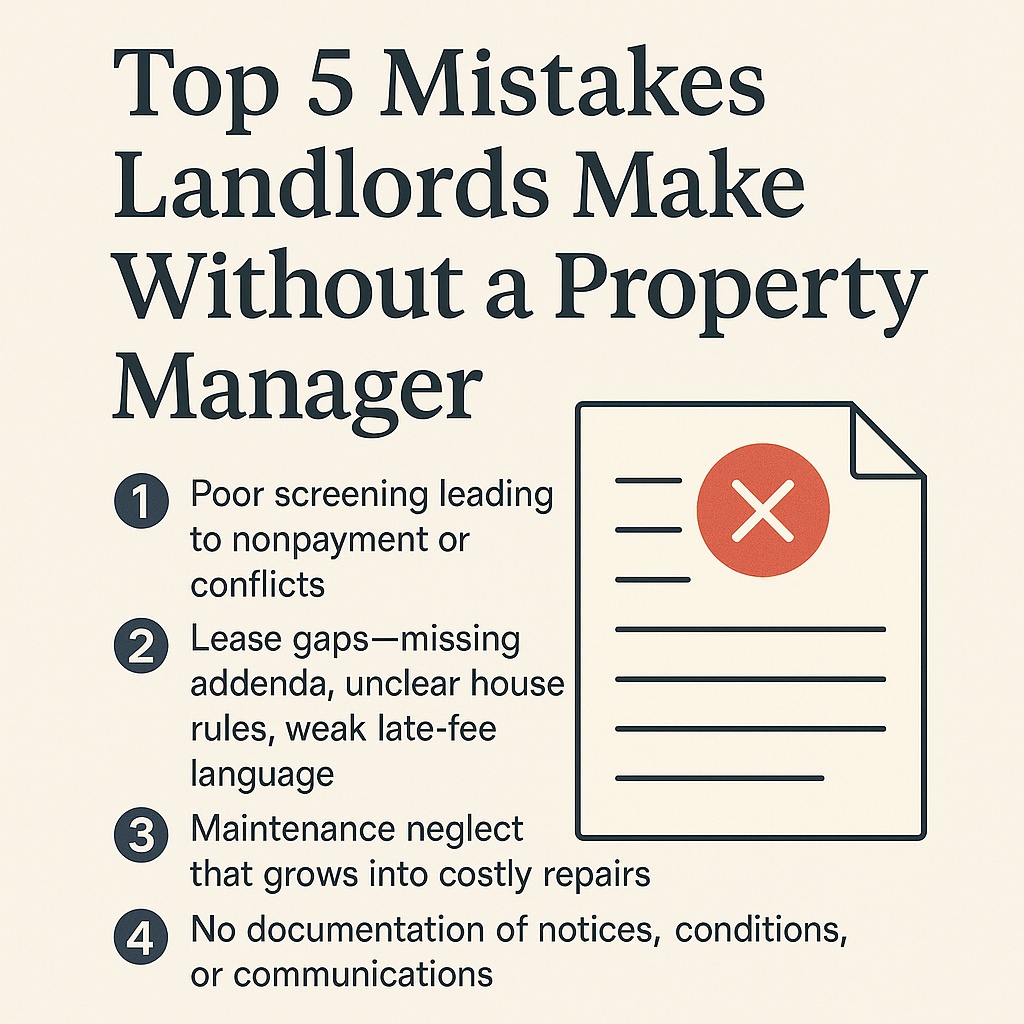Top 5 Mistakes Landlords Make Without a Property Manager
Managing rental property on your own can seem like a great way to save money—but many self-managing landlords end up paying far more in the long run. From missed rent to costly repairs, the most common DIY mistakes stem from lack of time, experience, or proper systems. Here are the top five pitfalls independent landlords face—and how to avoid them.
1) Poor Tenant Screening
Tenant screening is one of the most important parts of property management—and one of the easiest to get wrong. Without standardized criteria and professional tools, landlords may approve tenants based on incomplete or misleading information. This can lead to late payments, property damage, or costly evictions.
- Common mistake: Accepting the first applicant without full verification of credit, income, and rental history.
- Why it matters: One bad tenant can erase an entire year’s profit through nonpayment or legal fees.
- Best practice: Use written screening criteria and third-party background checks. Verify employment and request landlord references. Always follow Fair Housing and New Jersey Tenant Screening laws to avoid discrimination claims.
2) Weak or Incomplete Leases
Generic or outdated lease templates can leave landlords exposed to serious legal and financial risk. Many DIY landlords rely on forms downloaded online that don’t comply with current state or local law, or they fail to include the required New Jersey addenda and disclosures.
- Common mistake: Using vague language about maintenance responsibilities, late fees, or entry rights.
- Why it matters: Ambiguities are interpreted against the landlord in court. A missing clause can make enforcing a lease—or collecting damages—impossible.
- Best practice: Use a New Jersey–specific lease drafted or reviewed by an attorney. Include all required disclosures (lead paint, security deposit terms, registration info) and clear house rules.
3) Maintenance Neglect
Deferred maintenance is one of the most expensive landlord mistakes. Small issues like a leaky faucet or roof stain can quickly escalate into thousands in structural damage. Many self-managing landlords postpone repairs to save cash—only to face emergency costs later.
- Common mistake: Ignoring preventative maintenance or tenant complaints until problems worsen.
- Why it matters: Poor maintenance violates New Jersey’s habitability law and can justify rent withholding or legal action from tenants.
- Best practice: Set a preventive maintenance schedule and use trusted vendors. Document all service requests and responses. Regular inspections help identify issues early.
4) Poor Documentation
Good records are a landlord’s best defense in disputes. Without proper documentation—such as written notices, photos, receipts, and tenant communication logs—it’s nearly impossible to prove your case in court or justify security deposit deductions.
- Common mistake: Managing by memory—no written notes, inspection reports, or follow-ups.
- Why it matters: Judges require proof, not recollection. If it isn’t documented, it didn’t happen.
- Best practice: Keep a digital or cloud-based file for each tenant. Save emails, maintenance logs, inspection photos, and notices. Consider using property management software for organization and legal compliance.
5) Pricing Errors and Vacancy Loss
Setting the wrong rent price is one of the easiest ways to lose money—either by charging too little and missing revenue or too much and driving up vacancy. Many landlords base pricing on outdated comps or emotional attachment to the property instead of real-time market data.
- Common mistake: Guessing rent based on similar listings without verifying actual leased prices.
- Why it matters: Every month a unit sits vacant can cost hundreds or thousands of dollars in lost rent—far more than any management fee.
- Best practice: Research recent rentals in your area using MLS or local rental reports. Adjust pricing seasonally and consider offering incentives to reduce downtime between tenants.
Hidden Costs of Self-Management
Even if you save on management fees, self-managing often comes with hidden expenses:
- Vacancy from slower leasing and poor marketing.
- Higher maintenance costs from delayed response or lack of vendor discounts.
- Legal exposure due to compliance mistakes or improper notices.
- Emergency service premiums for after-hours calls.
- Opportunity cost of your own time—especially nights, weekends, and stress.
These factors can easily outweigh the savings of doing it yourself—especially for landlords juggling multiple units or full-time jobs.
How to Prevent These Mistakes
The best defense is building professional-grade systems—even if you manage your own properties. Follow these key principles:
- Standardize tenant screening: Create written approval criteria and stick to them.
- Use a strong lease: Ensure it’s updated for New Jersey laws and includes all required addenda.
- Follow a maintenance plan: Schedule annual inspections, filter changes, and preventative work.
- Document everything: Keep a digital record of communications, work orders, and payment receipts.
- Leverage tools: Use management software or online platforms for rent collection and reporting.
Hidden DIY costs: vacancy, legal exposure, emergency premiums, and the opportunity cost of your time can quietly erode profits—even if you never hire a professional manager.
Prevention: Implement standardized screening, use a solid lease, set up a preventative maintenance plan, and keep a communication log. If you prefer a hands-off approach, hiring a qualified property manager can often save time, stress, and money in the long run.
Disclaimer: This article is for informational purposes only and does not constitute legal or financial advice. Always review current New Jersey landlord–tenant laws or consult a property management professional before making decisions about your rental property.

